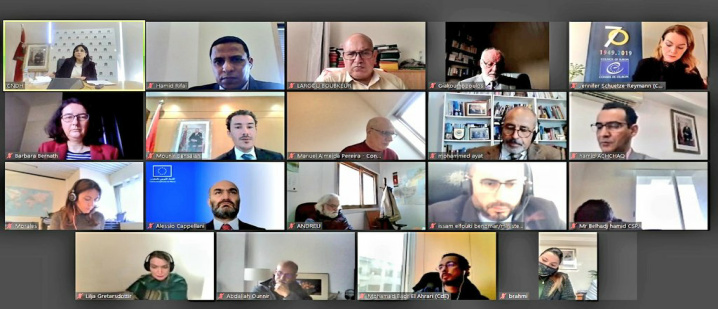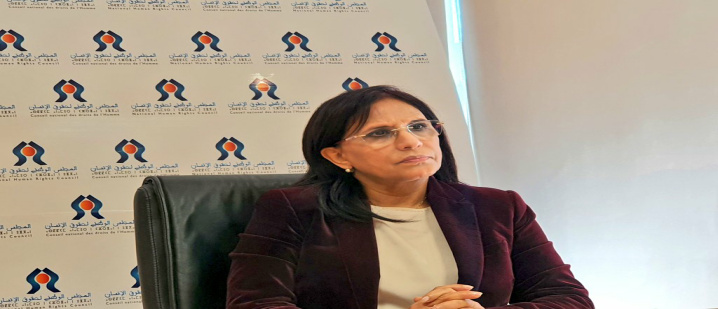NPM: 11 visits to places of deprivation of liberty in six Moroccan cities to assess conditions and strengthen the prevention of torture

On Tuesday morning, January 26, 2020, the National Human Rights Council (CNDH), the European Union (EU) and the Council of Europe (CoE) launched a program to support the National Mechanism for the Prevention of Torture (NPM) in Morocco which will be conducted over 36 months.
This program is the result of tripartite cooperation. It aims to (1) support the NPM by enhancing the capacities of members and staff, through theoretical and practical training on the mechanism’s functions as determined by both national and international laws; (2) exchange best practices acquired from training visits to the European mechanisms and participation in various regional and international activities; and (3) develop working tools for the mechanism's missions.
In her opening statement at this online event, Mrs. Amina Bouayach, CNDH Chairperson, said that this project is part of an inclusive, consultative and participatory approach. She also stressed that the CNDH is firmly committed to cooperate with all actors within the framework of this approach. Besides, Mrs. Bouayach welcomed all the joint initiatives among the CNDH, the EU and the CoE in the field of the prevention of torture.
Mrs. Bouayach stressed that the establishment of the Moroccan NPM in September 2019 is part of the implementation of the recommendations of the Equity and Reconciliation Commission (IER) and then the implementation of the provisions of the Optional Protocol to the Convention against Torture (OPCAT) which confirms the effective and real commitment of Morocco to prevent torture and other cruel, inhuman and degrading treatment.

The CNDH Chairperson announced that, since April 2020, the NPM has conducted 11 visits to prisons, child and elderly protection centers, police and gendarmerie custody centers in Rabat, Casablanca, Tetouan, Tangier, Settat and Dakhla. She also added that the mechanism intends to visit new places in other cities.
Within the same context, Mrs. Bouayach noted the constraints faced by the NPM in the context of the COVID-19 pandemic. She said that the NPM was forced to create tools adapted to the situation of the pandemic while ensuring the effective continuity of conducting the mechanism’s missions during visits. Priority was given to monitoring preventive measures against COVID-19 in places of deprivation of liberty and compliance with the directives of the Subcommittee on Prevention of Torture (SPT).
At the end of her statement, Mrs. Bouayach affirmed that the choice of the Moroccan legislator to entrust the functions of the NPM to the CNDH would enhance the effectiveness of the mechanism to fully fulfill its missions related to the prevention of torture and other cruel, inhuman or degrading treatment.
For his part, Mr. Mohamed Benajiba, NPM Coordinator, presented the stages of the establishment of the mechanism within the CNDH, since the publication of the CNDH new law No.15.76 relating to its organization. Mr. Benajiba considered that this law provides the mechanism all guarantees to conduct its missions and roles in the best possible and appropriate conditions and in full compliance with the provisions of the OPCAT, as well as the directives of the SPT.
In his presentation, Mr. Benajiba also addressed the current context of the mechanism's work and its conditions within the context of the COVID-19 pandemic. The NPM coordinator noted the importance of the project to support the mechanism, which will enhance the performance of its missions and contribute to improving the conditions of persons in places of deprivation of liberty.
The opening session of this high-level online event officially launched the program of this project aiming to support the NPM in Morocco.
Ms. Verena Taylor, Director of the Office of the Directorate General of Programs (CoE), Mr. Alessio Cappellani, Deputy Head of the EU Delegation to Morocco, Mr. Christos Giakoumopoulos, Director General of Human Rights and Rule of Law (CoE, Strasbourg) participated in the opening session of this event.
The experts’ panel on the challenges and concrete expectations related to the implementation of the NPM was moderated by Mr. Mohammed Ayat, Chairman of the United Nations Committee on Enforced Disappearances with the contribution of Mr. Abdallah Ounnir, member of the Subcommittee on the Prevention of Torture (SPT).






















